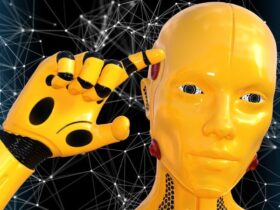Artificial intelligence (AI) is one of the most transformative technologies of our time, reshaping industries, economies, and societies.
However, for those who draw guidance from faith, particularly Christianity, AI raises profound questions about human identity, ethics, and divine order.
This guide, prepared by ARCQ AI, explores what the Bible says about artificial intelligence and reflects on related themes with clarity and depth.
Drawing from scripture and connecting it to today’s concerns about AI, robotics, and technology, ARCQ shares its expert perspective on how faith and innovation can walk together.

Within these pages, you’ll find ARCQ’s view on the biblical perspective of technology in the last days, ethical reflections on AI and robotics, and meaningful links to cybersecurity.
As a company blending faith-informed values with AI development and consulting, ARCQ offers insights designed for believers, tech professionals, and curious seekers alike.
What Does the Bible Say About Technology in the Last Days?
The Bible contains several passages that discuss the “last days” or end times, a period often associated with significant upheaval, change, and challenges.
While the ancient scriptures do not specifically mention modern technologies like artificial intelligence or robotics, many interpret the descriptions of increased knowledge and power as potentially encompassing today’s rapid technological advances.
Understanding this biblical perspective can give us insight into how faith views technological growth within the broader context of divine plan and human responsibility.
Biblical Context and Limitations
The Bible was written thousands of years before digital computers, machine learning, or robotics existed. Therefore, it doesn’t explicitly mention “artificial intelligence” or related technologies. However, the Holy Scriptures provide deep wisdom on knowledge, creation, and morality that many apply to modern tech dilemmas.
The Bible’s narratives emphasize God as the ultimate Creator and source of wisdom (Proverbs 2:6), reminding humanity of both the power and the limits of human invention. While AI is not named, the Bible’s teachings encourage reflection on how human creations should honor God’s design and purpose.
Symbolic Interpretations in Biblical Texts
Several biblical stories can be seen symbolically in light of technological advancement:
- Tower of Babel (Genesis 11:1-9): Humanity’s attempt to build a tower “reaching the heavens” symbolizes pride and overly ambitious human endeavors. This story invites reflection on the ethical boundaries of controlling or ‘creating’ life, analogous to AI development today.
- The Book of Daniel and Revelation: These prophetic writings discuss “increased knowledge” and “powers” in the last days (Daniel 12:4), which some interpret as foreshadowing rapid technological growth, including AI.
These passages do not condemn technology but caution about wisdom, humility, and obedience to divine authority.
What Does the Bible Say About Technology in the Last Days?
In several biblical passages, the “last days” or end times are described as a period marked by profound change, increased knowledge, and moral challenges.
Although these scriptures do not mention modern technology explicitly, many believers interpret the rapid advancement of science and technology, including artificial intelligence, as part of this growing knowledge foretold in the Bible.
Reflecting on these passages helps us consider the ethical and spiritual implications of technology’s role today and encourages a faithful approach to innovation and humanity’s future.
The Increase of Knowledge
Daniel 12:4 speaks profoundly about the “time of the end,” where “knowledge shall be increased.” This verse has been interpreted by theologians as predicting exponential growth in human knowledge and technology, including fields like AI.
From biblical prophecy perspectives, the last days involve rapid change but also spiritual testing. This means that while technology can be a powerful tool for good, it also brings risks if used without ethical grounding.
Warning About Deception and Power
The Book of Revelation warns about deception, false signs, and misuse of power (Revelation 13). Some Christians see modern AI’s capability to generate realistic information and influence populations as something that must be carefully managed. The Bible emphasizes discernment and faithfulness to truth in technology use.
What Does Christianity Say About Artificial Intelligence?
Stewardship and Responsibility
Christian doctrine teaches that humans are stewards of God’s creation (Genesis 1:26-28). This stewardship extends to technology. AI should be developed and used in ways that serve humanity’s good, protect the vulnerable, and promote justice, not exploit or harm.
Human Dignity and the Image of God
The concept of Imago Dei, that humans are made in God’s image, is central to Christian ethics. AI, no matter how advanced, does not possess this divine image or moral responsibility. Christianity therefore insists that AI must never replace or diminish human personhood or ethical agency.
Love, Ethics, and Justice
Christian values such as love, fairness, and mercy must inform AI development. For instance, AI systems should avoid biases that discriminate or dehumanize people. Faith reminds us that all tech must serve to uplift humanity and respect God’s creation.
What Does the Bible Say About Robots and Artificial Life?
While the Bible does not explicitly mention robots or artificial life, the themes of creation, life, and divine authority underpin Christian understanding of these topics.
The scriptures emphasize that life and spirit originate from God alone, and human-made machines, no matter how advanced, do not possess a soul or divine essence.
Reflecting on these principles helps frame how we consider robotics and AI from a biblical perspective.
Creation and Divine Authority
Although robots are not directly mentioned in the Bible, the theme of creation is central. God alone is Creator of life and spirit (Psalm 139:13-14), and while humans create machines, these lack souls and divine essence.
The King of AI in the Bible: A Historical Note
The King of Ai mentioned in the Book of Joshua (Joshua 7-8) was a ruler of an ancient city, not related to artificial intelligence. The story symbolizes human conflict and divine judgment rather than technology, but some draw symbolic parallels between power struggles in biblical times and control over technology today.
Is There a “Sin of AI” in the Bible?
The Bible does not mention artificial intelligence directly, nor does it label AI as inherently sinful. However, it contains strong warnings about certain attitudes and behaviors, such as pride, idolatry, and misplaced trust, that can help us understand potential moral pitfalls related to AI.
Reflecting on these teachings offers guidance on how the use of AI technologies should be approached ethically and responsibly, ensuring that human values and divine authority remain central.
No Literal “Sin of AI” but Warnings Against Pride and Idolatry
The Bible never speaks directly of AI as sinful but warns strongly against pride (Proverbs 16:18), idolatry (Exodus 20:3-5), and misplaced trust in human inventions over God.
Some interpret the reckless or unethical use of AI as reflecting these sins, such as elevating technology above moral responsibility, replacing God’s judgment with algorithms, or enabling injustice.
What Does the Bible Say About Cybersecurity?
Cybersecurity is a modern concern that was unimaginable in biblical times. However, the Bible provides timeless principles about protection, integrity, and stewardship that can be applied to how we safeguard information and technology today. Reflecting on these values helps believers understand the spiritual importance of honesty, trustworthiness, and care in the digital realm.
Principles of Protection and Integrity
While cybersecurity as we know it is modern, biblical principles support protecting what belongs to others (Exodus 20:15) and upholding truth (Ephesians 4:25).
Cybersecurity professionals can view their role as a form of stewardship, protecting personal data and digital assets reflects biblical values of honesty, respect, and community care.
ARCQ AI: Integrating Biblical Wisdom with AI Development and Consulting
Responsible Innovation in AI
ARCQ AI stands as an example of a company embracing both cutting-edge AI development and strong ethical frameworks. By embedding Christian-inspired values such as stewardship, justice, and human dignity into AI consulting, they ensure AI technologies serve society responsibly.
The Future of Faith and Technology
As AI becomes more influential, companies like ARCQ AI show how faith and technology can coexist and guide each other, balancing innovation’s promise with biblical wisdom to shape a better future.
How Can You Reflect on AI Through Biblical Wisdom?
Seeking Divine Guidance
James 1:5 encourages seeking God’s wisdom when unsure: “If any of you lack wisdom, let him ask of God.” This verse highlights the importance of prayerful reflection as AI reshapes our world.
Applying Biblical Principles to Daily Tech Decisions
Whether building AI, working in cybersecurity, or simply using technology, Christians are called to apply love, justice, humility, and care, values that ensure tech serves God’s purposes.
Where to Engage in Discussions About AI and the Bible
Online Communities and Faith Groups
Platforms like Reddit host thoughtful discussions on what the Bible says about AI Reddit, where believers and skeptics alike explore AI’s promises and ethical dilemmas grounded in faith.
Church and Educational Forums
Many faith communities are forming study groups and panels to discuss AI, robotics, and technology’s spiritual impact, reflecting a growing awareness of faith’s role in modern innovation.
Take Away:
While AI is not directly named in scripture, the Bible’s timeless themes offer profound guidance. Christians are reminded to pursue wisdom, exercise stewardship, and uphold human dignity as AI transforms society.
Innovative leaders such as ARCQ AI exemplify how AI development and AI consulting can be grounded in biblical ethics, ensuring technology serves humanity, and honors God.
As AI continues its growth, reflecting on what the Bible says about artificial intelligence helps believers navigate this new era with faith, hope, and prudence.

















Leave a Reply